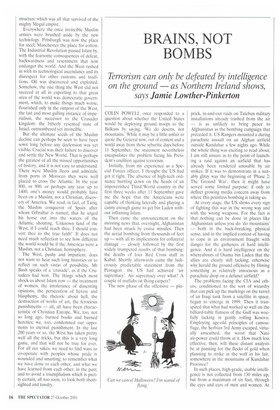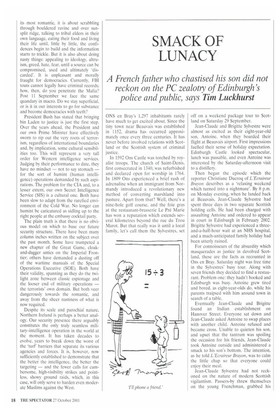BRAINS, NOT BOMBS
Terrorism can only be defeated by intelligence on the ground — as Northern Ireland shows,
says Jamie Lowther-Pinkerton
COLIN POWELL once responded to a question about whether the United States would be deploying ground troops to the Balkans by saying, 'We do deserts, not mountains.' While it may be a little unfair to quote the General now, out of context and a world away from those sybaritic days before 11 September, the statement nevertheless encapsulates the problem facing his President's coalition against terrorism.
Initially, from my experience as a Special Forces officer, I thought the US had got it right. The absence of high-tech ordnance hurtling down on the heads of an impoverished Third World country in the first three weeks after 11 September gave me the hope that the Americans were capable of thinking laterally and playing a canny enough game to get bin Laden without inflaming Islam.
Then came the announcement on the morning news that, overnight, Afghanistan had been struck by cruise missiles. Then the aerial bombing from thousands of feet up — with all its implications for collateral damage — closely followed by the first widely trumpeted results of that bombing: the deaths of four Red Cross staff in Kabul. Shortly afterwards came the ludicrously predictable statement from the Pentagon: the US had achieved 'air supremacy'. Air supremacy over what? A couple of mullahs on flying carpets?
The new phase of the offensive — pin prick, in-and-out raids on Taleban military installations already trashed from the air — is as unlikely to bring peace to Afghanistan as the bombing campaign that preceded it. US Rangers mounted a daring parachute assault on an Afghan airfield outside Kandahar a few nights ago. While the whole thing was exciting to read about, I am still unsure as to the point of launching a raid against an airfield that has already been rendered unusable by air strikes. If it was to demonstrate in a suitably glitzy way the beginning of 'Phase 2: The Ground War', then it might have served some limited purpose: if only to deflect growing media concern away from where this pointless bombing is taking us.
At every stage, the US shows every sign of fighting this war in the wrong way and with the wrong weapons. For the fact is that nothing can be done in places like Afghanistan unless you do 'do mountains' — both in the back-breaking, physical sense, and in the implied context of having to cope in an environment fraught with danger for the gatherers of hard intelligence. And it is hard intelligence on the whereabouts of Osama bin Laden that the allies are clearly still lacking; otherwise why herald the ground offensive by filming something as relatively innocuous as a parachute drop on a defunct airfield?
The problems facing the CIA and others, conditioned to the sort of wizardry that can pick up the markings on the turret of an Iraqi tank from a satellite in space, began to emerge in 1999. Then it transpired that what had worked so well on the billiard-table flatness of the Gulf was woefully lacking in gently rolling Kosovo. Employing age-old principles of camouflage, the Serbian 3rd Army escaped, virtually unscathed, the worst that Nato air-power could throw at it. How much less effective, then, will these distant analysts be at panning for the flecks of gold when planning to strike at the wolf in his lair, somewhere in the mountains of Kandahar Province?
In such places, high-grade, usable intelligence is not collected from 130 miles up, but from a maximum of six feet, through the eyes and ears of men and women. At its most romantic, it is about scrabbling through bouldered ravine and over sunsplit ridge, talking to tribal elders in their own language, eating their food and living their life until, little by little, the confidences begin to build and the information starts to trickle. But it is also about doing nasty things: appealing to ideology, altruism, greed, hate, fear, until a source can be compromised, used and ultimately 'discarded'. It is unpleasant and morally fraught for democracies. Currently, FBI touts cannot legally have criminal records; how, then, do you penetrate the Mafia? Post 11 September we face the same quandary in macro. Do we stay superficial, or is it in our interests to go for substance and become democracies with teeth?
President Bush has stated that bringing bin Laden to justice is just the first step. Over the years ahead, the President and our own Prime Minister have effectively sworn to rip out the very roots of terrorism, regardless of international boundaries and, by implication, some cultural sensibilities too. This will represent a very tall order for Western intelligence services. Judging by their performance to date, they have no mindset not to say stomach — for the sort of humint (human intelligence) operations demanded by such aspirations. The problem for the CIA and, to a lesser extent, our own Secret Intelligence Service (SIS) is a cultural one. Both have been slow to adapt from the rarefied environment of the Cold War. No longer can humint be caricatured as sidling up to the right people at the embassy cocktail party.
The plain truth is that there is no obvious model on which to base our future security structure. There have been many column inches written on the subject over the past month. Some have trumpeted a new chapter of the Great Game, cloakand-dagger antics on the Imperial Frontier; others have demanded a dusting off of the wartime manuals of the Special Operations Executive (SOE). Both have their validity, spanning as they do the twilight zone between classic espionage and the looser end of military operations — the terrorists' own domain. But both veer dangerously towards the romantic, and away from the sheer nastiness of what is now required.
Despite its scale and parochial nature, Northern Ireland is perhaps a better analogy. Our security presence there arguably constitutes the only truly seamless military–intelligence operation in the world at the moment. It has taken decades to evolve, years to break down the worst of the 'turf' barriers that separate its various agencies and forces. It is, however, now sufficiently established to demonstrate that the better the intelligence, the better the targeting — and the fewer calls for cumbersome, high-visibility strikes and pointless, showy ground raids, which, in this case, will only serve to harden even moderate Muslims against the West.











































































 Previous page
Previous page